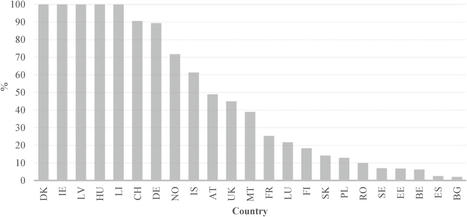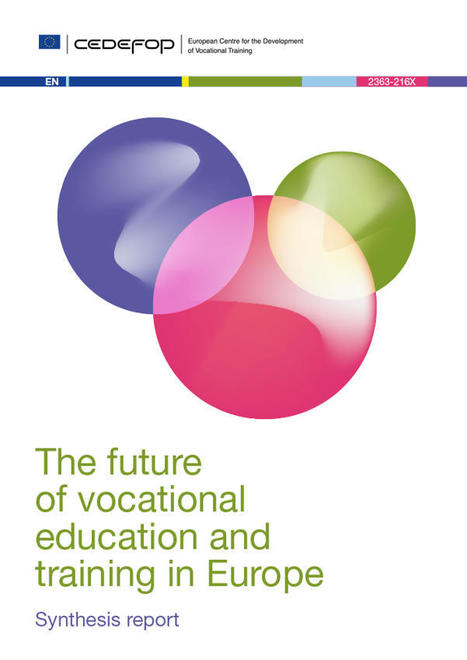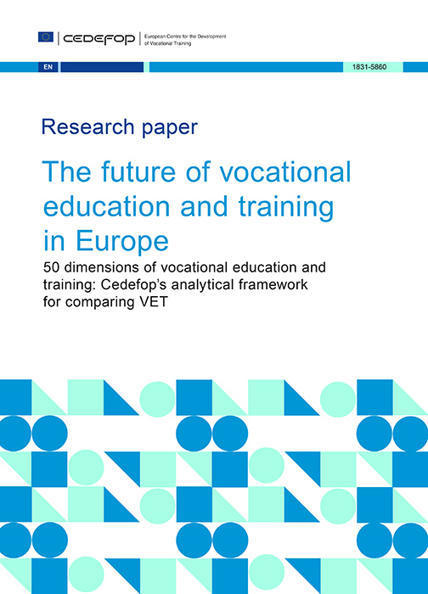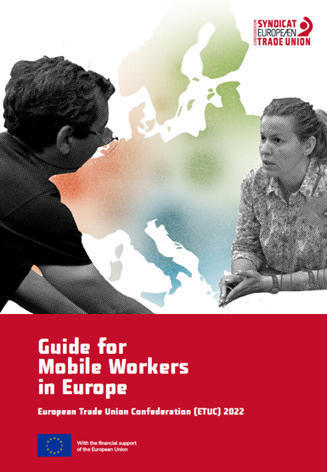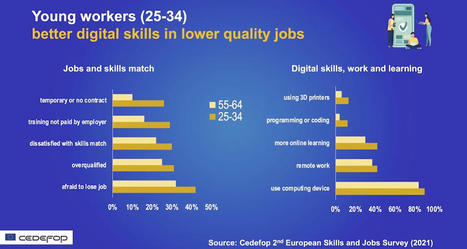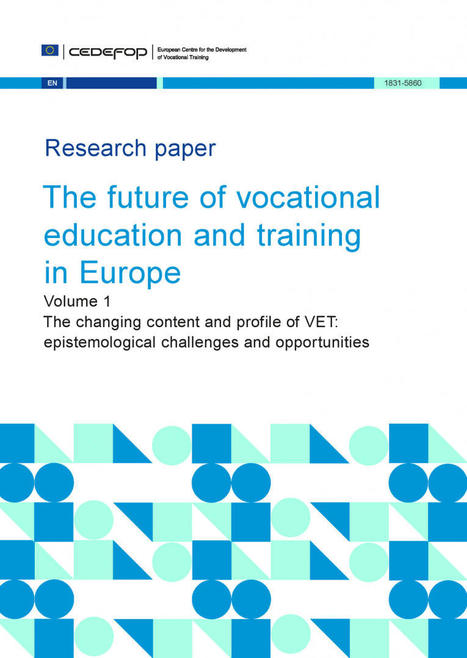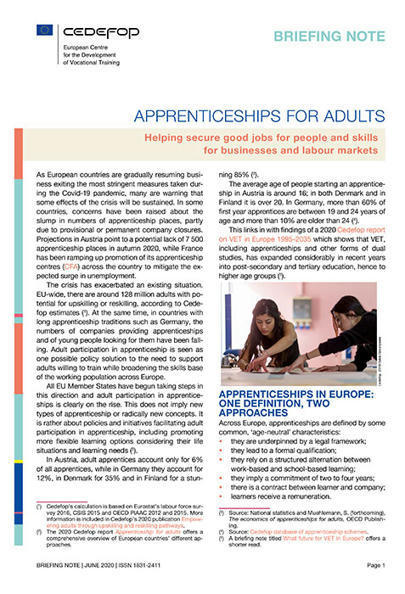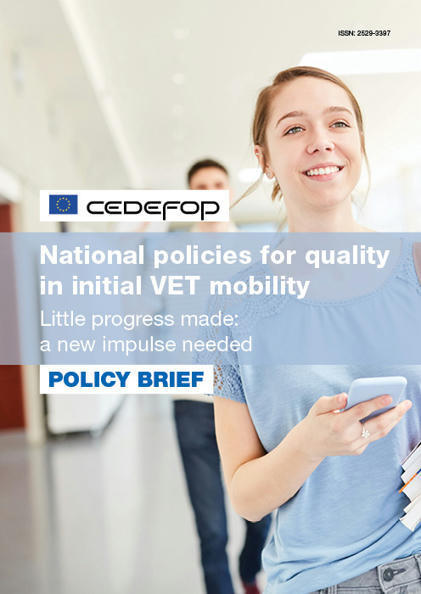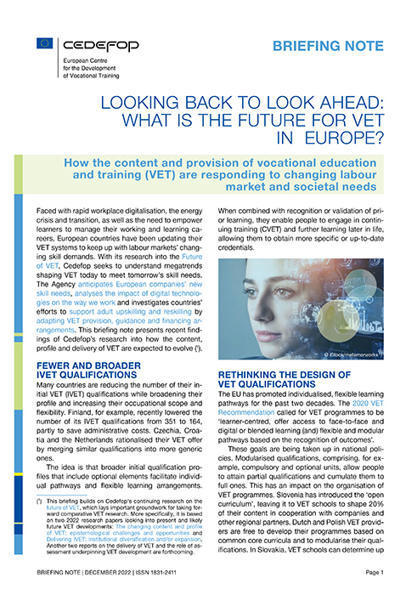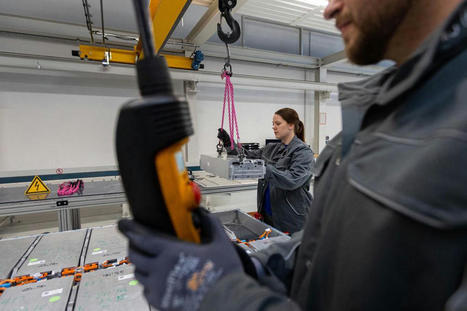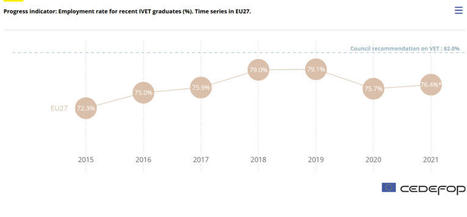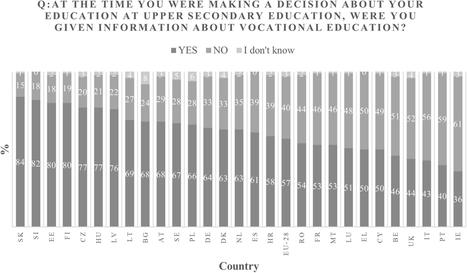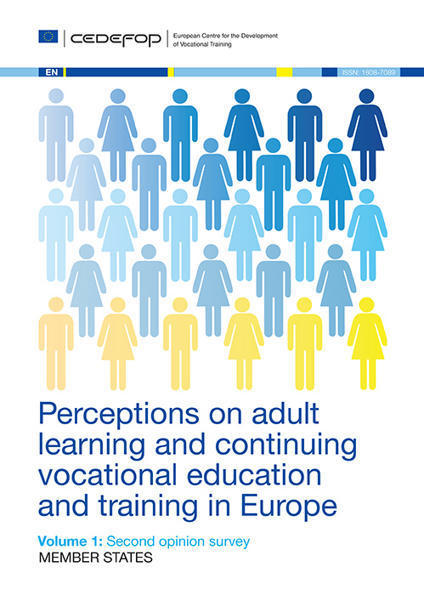 Your new post is loading...
 Your new post is loading...
This policy brief contributes to better understanding of national qualifications frameworks (NQFs) in Europe by providing insights into their main characteristics, scope and coverage, along with a discussion on their impact and the extent to which they are used.
The analysis is based primarily on information from Cedefop’s European inventory of NQFs, which was updated in cooperation with the European Commission, the ETF and the countries participating in the EQF process.
This article aims to analyze vocational education and training in Europe and to model mechanisms of educational and vocational choice. First, we expose the differences between VET approaches in Europe. Secondly, a sociological analysis is provided. When VET systems were first created, aspects such as work culture or diverging political concerns led to different responses in the various countries. Thirdly, we present a psychological approach of the educational and vocational choice which draws on a process where profession images are compared with one’s own self-image. Finally, we present an integrated explanatory model of the vocational choice, based on sociological and psychological dimensions. In conclusion, we propose several plans of action in order to support and inform students regarding educational choice and to improve valorization of the VET track.
To make and shape the green and digital transitions, Europe needs a skills revolution. Sitting alongside the current VET and skills policy framework and expanding funding opportunities, Cedefop EU skills intelligence is a key resource that helps unleash it. Skills intelligence provides sound and trusted evidence on labour market trends and skill needs, which guides policy- and decision-makers in focusing their efforts when investing in skills and in skills matching.
This report is one of Cedefop’s key contributions to the 2023 European Year of Skills. It broadens understanding of what has changed in EU labour markets in the past decade and uses Cedefop’s 2023 skills forecast, sectoral foresight and big data-powered analysis to track ongoing and future trends. The report blends different types of evidence to foster better understanding of the labour market and skills impacts of the twin transition and current and future labour markets tensions.
The Future of VET study examined how vocational education and training (VET) has changed since the mid-1990s, and how this may influence future opportunities and challenges.
This synthesis report summarises 3 years of research involving researchers and VET experts across Europe, with discussion of findings on the content and delivery of VET, assessment practices, and the link between initial and continuing VET. In addition to connecting and synthesising the series of research papers and case studies already published, it features an analysis by country. The study provides important insights into how VET in Europe has developed over the past three decades, illustrating observed trends and developments, as well as tendencies of convergence between countries and systems.
The research has also shown that the development of VET does not necessarily form an unbroken chain leading in one direction but can be interrupted by changes of course and even reversals in policy and practice. The future of VET is still unwritten. This report aims to provide a stimulus for developing future research in this area.
This analytical report presents a review of evidence regarding access to, and the process of acquiring, skills for the green economic transition across initial vocational education and training (IVET), as well as lifelong learning (LLL) opportunities for people already in the labour market. The report focuses on groups in society that may be particularly affected by the greening of the economy. The policy context for this paper is provided by the EU’s ambitions for the green transition. These are set out in a number of policy documents that highlight the importance of skills in achieving these green goals. The report focuses on three interlinked aspects: (1) it provides characteristics of green(er) jobs and skills; (2) it assesses the extent to which current education and training provisions ensure equal access to the acquisition of green(er) skills; and (3) it provides illustrative examples of practices adopted by Member States to create equal and just access to green(er) education and training opportunities.
This report presents a holistic approach to understanding and comparing vocational education and training (VET) systems.
The approach has been developed jointly by a group of interdisciplinary VET researchers over a 5-year period as part of Cedefop's research on the future of VET and has been reviewed several times. The framework introduces 50 dimensions for analysing VET systems, as well as parts of them, structured according to three overlapping main perspectives: epistemological and pedagogical, education system, and socioeconomic or labour market. The framework is particularly suited to ‘clearing the ground’ for policy work and provides a model for how research can support policy. This model can be flexibly adapted and applied in any comparative research or international policy learning activity related to VET.
The report focuses on the needs of providers of services of general interest (SGI) operating in the water, energy, and transport sector in selected countries (Belgium, France, Germany, the Netherlands, Spain, and Portugal). The research also investigated the possible cooperation between vocational education and training (VET) institutions.
En français. Europe. Compétences vertes dans l’enseignement et la formation professionnels
This Guide is dedicated particularly to those who inform and advise this group of Europe-wide mobile workers, including especially the EURES advisers who are trained by the European Commission in issues of the mobility of workers at transnational and cross-border level and are active in employment services, trade unions or employers’ organisations.
Those who (want to) work in another country, have many questions, for example:
Do I need a work permit?
Will my professional qualification be recognised?
Which labour applies to me?
What do I have to if I am unemployed?
In which country do I have to pay taxes?
While investing in skills will remain a crucial factor for the twin, green and digital, transitions, it will also be vital in the coming years to invest in jobs that are learning-intensive, that make use of the skills of young people and give them a springboard to a successful career.
The need for investment and for a holistic approach to VET teachers’ and trainers’ professional development is at the heart of high-quality and inclusive VET.
Building on the findings of Cedefop/ReferNet thematic perspectives for EU Member States, Norway and Iceland, this synthesis report identifies recent trends and policy developments in Europe on the initial and continuous professional development of VET teachers and trainers.
The report points to the different types of VET teachers and trainers in Europe; their evolving and complex role in mastering new technologies, supporting the integration of refugees, identifying and supporting learners at risk of early leaving, and understanding changing labour market needs, to empower and equip students with skills for the future.
Their qualifications and opportunities for continuous professional development vary across countries but the challenges policy-makers face in supporting them are shared. The report concludes with key messages for designing effective policies in Europe.
Career guidance and counselling are key features of comprehensive strategies aiming to reduce early leaving from education and training. They may assist students, not only in terms of decision-making but also in managing their transitions within education and training pathways or from education to employment.
Apprenticeships for adults are one of the policy solutions to the need for supporting adults willing to train, while broadening the skills base of the working population across Europe.
|
The NQF online tool is a rich source of information on the qualifications frameworks and systems of the 41 countries participating in the European qualifications framework (EQF) process. Policy-makers, researchers, and the wider public can learn about the structure and scope of the NQFs, and get information on their implementation, impact and future priorities.
The NQF online tool presents, through an interactive map/grid, information on the state of play of the NQF of each country in 2018, 2020 and 2022. Information is organised in thematic categories, and can be compared for two countries (Country comparison). In addition, through the EQF users can compare qualification types between two countries (Qualification comparison), and have an ‘Overview’ of the main features of all NQFs across Europe.
The information displayed in the tool is collected biennially by Cedefop together with the European Commission and ETF, in cooperation with countries and the EQF national coordination points.
We hope the wealth of information presented will inspire and support all those interested in developing transparent and accessible education and training systems, and those navigating through the various European qualification types.
Detailed information on 2022 developments in the accession and pre-accession countries (Albania, Bosnia and Herzegovina, Georgia, Kosovo, Moldova, Montenegro, North Macedonia, Serbia, Turkey, and Ukraine) will be available in the second quarter of 2024.
The European Union policy for education and training attaches great importance to enabling learners to become familiar with international mobility. Acquiring such experience while in studies is seen as crucial to improving labour mobility later.
This allows EU economies to address spatial imbalances in labour availability and transnational enterprise needs for mobile staff. A range of EU-level vocational education and training (VET) policy initiatives to support learner mobility has been undertaken since the 1960s. Major moves to ensure the quality of mobilities were made in 2006 (European Quality Charter for Mobility) and 2011 (Youth on the move recommendation).
This policy brief takes stock of national efforts to improve the quality of international learning mobility in initial VET over the past decade. It shows that countries have made progress, although areas for improvement remain in terms of quality frameworks and policy governance.
This synthesis report summarises 3 years of research involving researchers and VET experts across Europe, with discussion of findings on the content and delivery of VET, assessment practices, and the link between initial and continuing VET. In addition to connecting and synthesising the series of research papers and case studies already published, it features an analysis by country.
The Timeline of VET policies in Europe is a rich collection of strategies, action plans, legal acts, regulations, and practical measures in vocational education and training (VET) and lifelong learning (LLL) in the EU Member States, Iceland and Norway. Policy-makers, analysts and practitioners in VET and LLL can learn about and explore national initiatives on various themes, and how these are linked to European priorities in VET, expressed in the Council Recommendation on VET and the Osnabrück Declaration.
The Timeline of VET policies in Europe presents the information as a timeline that helps observe how policies and practices develop over the years and through different stages, from design through implementation to completion. Information is organised in thematic categories allowing for filtering and comparison of the policies and practices presented by different criteria, such as country or target group.
The information has been collected by Cedefop annually since 2015 in cooperation with ReferNet, its European network of expertise in VET. Cedefop uses this information to monitor and analyse how countries work on achieving the common EU priorities.
We hope the wealth of information presented will inspire and support all those interested in the design or reform of policies and practices in VET and LLL.
This report has been prepared for DG EAC to provide a focused review of the literature published since 2018 on the provision of digital skills to adults in Europe. The review looks at the provision of medium-level digital skills by taking into consideration courses or programmes that are either work-based or provided in a non-formal and informal context and are targeted at adults of working age. The analysis focuses on understanding what aspects are addressed by policies relating to the development of digital skills among adults, what thematic areas and target groups are covered by the existing provision of digital skills, and how current provision addresses the needs identified.
This briefing reports on recent developments affecting Europe’s recognition regimes – both professional and academic.
At the start of 2023, the European Year of Skills, the author looks at the context facing higher education stakeholders across four areas: the European labour market, Ukraine, developments in the higher education sector and the legacy of Brexit. In the professional disciplines numerous challenges have already impacted on curriculum design and programme delivery. Triggering the revision of regulatory practice and EU legislation will take much longer, despite the urgent need for progress in sectors such as healthcare.
In the current, fast-changing education and labour market landscape, there is a need to promote more learner-centred strategies and to build bridges between initial and continuing vocational education and training (VET).
Cedefop’s latest briefing note on the future of VET provides insights into how training content and provision are changing to respond to labour markets’ rapidly evolving skill needs.
As employers struggle increasingly to find workers who fit the jobs on offer, it has become crucial to equip the European workforce with skills for the jobs of the future. Most lists of such skills drawn up by employers include not only technical (or hard) skills but also foundational (or soft) skills. These can be grouped into three categories: cognitive, interpersonal and self-management. Cognitive skills include critical thinking, problem-solving and analysis. Interpersonal skills include the ability to work in teams and to collaborate, along with communication and emotional intelligence. Self-management skills include self-regulation, resilience and adaptability.
The dashboard shows, as graphs and tables, the progress by the EU overall and its Member States separately towards agreed quantitative targets.
These targets are set out in the documents framing VET policy and its context at European level. The dashboard groups them around Europe’s three key post-2020 policy objectives:
VET for developing a lifelong learning culture;
VET for resilience, transitions, sustainability and excellence;
VET for the European Education Area.
This article aims to analyze vocational education and training in Europe and to model mechanisms of educational and vocational choice. First, we expose the differences between VET approaches in Europe. Secondly, a sociological analysis is provided. When VET systems were first created, aspects such as work culture or diverging political concerns led to different responses in the various countries. Thirdly, we present a psychological approach of the educational and vocational choice which draws on a process where profession images are compared with one’s own self-image. Finally, we present an integrated explanatory model of the vocational choice, based on sociological and psychological dimensions. In conclusion, we propose several plans of action in order to support and inform students regarding educational choice and to improve valorization of the VET track.
#Podcast. Young people not in education, employment or training (#NEETs) is a lose-lose situation The loss of the active labour force puts pressure on societies and economies. In the EU neighbourhood, the share of NEETs reaches 25-30% of people aged 15-29, and the lack of training or job opportunities demotivate young generation and make them vulnerable. So what can be done to tackle this situation?
|
 Your new post is loading...
Your new post is loading...
 Your new post is loading...
Your new post is loading...






